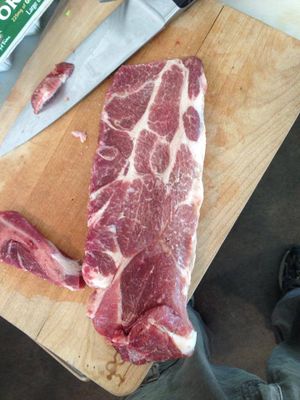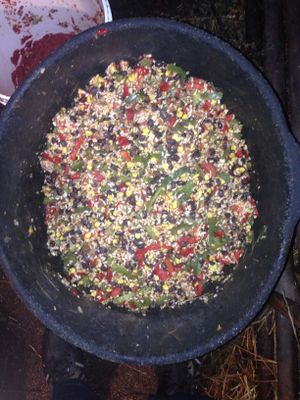Difference between revisions of "Jacob Springs pork program"
| Line 1: | Line 1: | ||
[[Image:QualityPork.JPG|thumb|Due to the high quality of swine breeding and feeding at Jacob Springs Farm, the pork produced there is of exceptional [[Pork quality|quality]] in color, flavor, tenderness and marbling.]] | [[Image:QualityPork.JPG|thumb|Due to the high quality of swine breeding and feeding at Jacob Springs Farm, the pork produced there is of exceptional [[Pork quality|quality]] in color, flavor, tenderness and marbling.]] | ||
| − | [[Jacob Springs Farm]] produces pork using a combination of [[traditional swine rearing|traditional]] methods and farming innovations to produce both the highest [[pork quality|quality pork]] and the highest possible [[Swine welfare|welfare]] for the animals while maximizing the economic viability of the business to sustain their farm community. This is in stark contrast to the [[modern swine rearing|modern methods of swine rearing]] | + | [[Jacob Springs Farm]] produces pork using a combination of [[traditional swine rearing|traditional]] methods and farming innovations to produce both the highest [[pork quality|quality pork]] and the highest possible [[Swine welfare|welfare]] for the animals while maximizing the economic viability of the business to sustain their farm community. This is in stark contrast to the [[modern swine rearing|modern methods of swine rearing]] which rely on cheap, [[grain subsidies|subsidized grain]], [[agro-industrial]] methods and [[economies of scale]] to raise pigs quickly |
[[Pork quality]] being a combination of breeding and feeding, Jacob Springs tries to maximize the quality of both while finding ways to make it profitable. | [[Pork quality]] being a combination of breeding and feeding, Jacob Springs tries to maximize the quality of both while finding ways to make it profitable. | ||
Revision as of 07:32, 26 January 2015

Jacob Springs Farm produces pork using a combination of traditional methods and farming innovations to produce both the highest quality pork and the highest possible welfare for the animals while maximizing the economic viability of the business to sustain their farm community. This is in stark contrast to the modern methods of swine rearing which rely on cheap, subsidized grain, agro-industrial methods and economies of scale to raise pigs quickly
Pork quality being a combination of breeding and feeding, Jacob Springs tries to maximize the quality of both while finding ways to make it profitable.
Contents
Breeding
Colorado Mutle, Red Wattle, Mulefoot
Crossbreeding, Heritage breeds, breeding for quality, forage ability, mothering and fecundity.
Feeding
Swine being omnivores thrive on a diverse diet and cannot subsist on hay alone as the herbivores can. However they can derive much of their feed (and, in rare cases, all of their feed) from foraging if given adequate habitat.
Along with chickens, swine are the ultimate recyclers in the right kind of production system, making use of "waste" foods that have few other uses other than composting. Swine can turn this into valuable proteins, manure and usable work. Jacob Springs uses cast-away people food as a primary source of feed for hogs.
- Food production waste: example Evol foods
- Resturant kitchen scraps: example: Horizons
- Brewers or distillers spent grain: examples: Bru Bistro and Anvil distillery
- Plate scrapings (no example)
- Day-old bread and pastries: example: Panera or Sprouts bakery
- Agricultural waste foods: example: Munson's sweet corn or pumpkins
- Grocery produce department waste: example: Sprouts Market
Natural farrowing
In the agro-industrial method of rearing swine farrowing is a much-criticized aspect of the process since strict confinement of sows in farrowing crates is the norm for several weeks of weaning. A [[farrowing crate does not allow the sow space to roll over or even to move but has an area allowing piglets access to the sow's teats to suckle. This is done to prevent the death of piglets, either by being crushed or stepped on by the mother or due to exposure to extremes of cold or, less commonly, heat. In a Danish study, piglets of sows that were allowed to farrow in pens, rather than in crates had a mortality rate of
Swine Habitat
- Legume pastures
- Thickets
- Post-harvest fields
Using swine labor
Sealing ponds and ditches
Plowing
Cleaning up crop residues
Clearing thickets
Composting
Marketing
Jacob Springs Farm markets their pork through their Meat CSA and through the sale of locker pork whole and half animals. Occasionally some pigs are sold for breeding purposes or for people to raise on their own.
